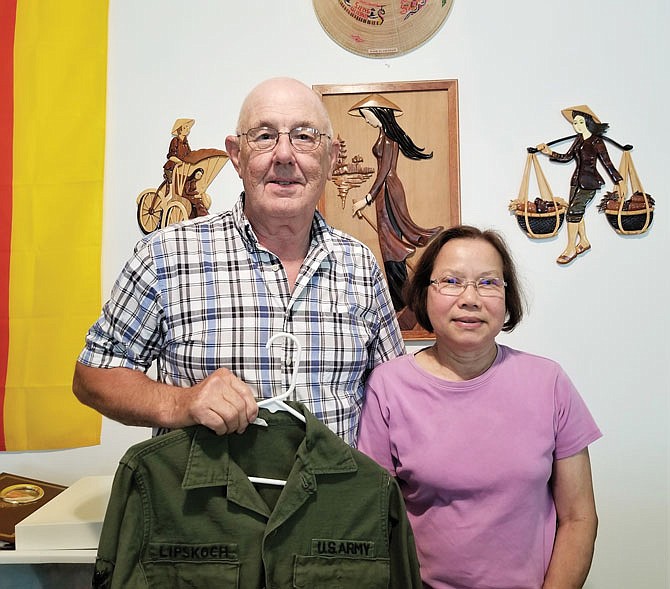Editor's note: This article is the first in a two-part series highlighting the Vietnam experiences of William and Rita Lipskoch.
During his one-year combat tour in South Vietnam in the late 1960s, William Lipskoch witnessed the loss of friends and fellow soldiers, leaving him with memories he chose to suppress for a number of decades. However, he joyfully maintains that one unforgettable moment from the war never to be forgotten is the young Vietnamese woman he met and married during his overseas deployment.
Born and raised on a farm near the small Osage County community of Hope, Lipskoch graduated from high school in nearby Linn in 1961. For the next couple of years, he worked at a couple of automotive garages in the area before enrolling at Linn Technical Junior College (now State Technical College of Missouri).
"I actually received my draft notice in January 1965, but I was granted a deferment until May so that I could graduate from Linn Tech," Lipskoch said. "Right after graduating, I was inducted into the U.S. Army and sent to Fort Leonard Wood for my basic training."
While in basic, he received orders to attend aviation electronics school and, in late July 1965, began 19 weeks of advanced training at Fort Gordon, Georgia. While there, he learned the fundamentals of radios and electronics and later underwent technical simulations to ensure he and his classmates could diagnose and repair radios and associated equipment.
Graduating in late December, he received orders for deployment to Vietnam but was able to enjoy a few days home during the Christmas holiday. He then flew to Oakland, California, spending a couple of days in orientation prior to boarding a flight bound for Vietnam.
"We flew into Saigon, and I eventually got orders for the Mekong Delta," Lipskoch recalled. "They sent me to the military base at Soc Trang in South Vietnam sometime around the second week of January 1966, and I was assigned to the 336th Assault Helicopter Company."
As part of his duties, the young soldier often accompanied the helicopter gunships during their flights to various landing zones in the region. During these missions, they dropped off ARVN (Army of the Republic of Vietnam) troops for combat operations. While the gunships were awaiting the return of the ARVN troops, Lipskoch worked to ensure the radios on the aircraft remained operational.
"Other times, when I wasn't repairing any issues that the crew chiefs identified with the radios, I was helping to work on the helicopters," he explained.
"While I was there," he solemnly, "we lost some good soldiers on helicopters that were shot down."
One moment that has remained forever emblazoned in his Vietnam reflections happened a few weeks after his arrival at Soc Trang when an aircraft returned from an intense and deadly mission.
"A helicopter was bringing some ARVN troops that had been on a mission back to the base," he explained. "Several had been killed, and some were missing legs and others were missing arms and they threw all the bodies in a big pile."
Following a brief pause, he added, "It was something I had never seen before and an image I have never forgotten."
During his off-duty hours, he occasionally visited the enlisted club, where he met a young Vietnamese woman named Rita Bui. She sold tickets the soldiers used to purchase drinks and other items at the club. In the evenings, she and the other Vietnamese locals working on the base were driven back to their nearby village in a military truck guarded by military police.
"I went to see her at the club whenever I could and then began walking her to meet the truck that carried her back to their village in the evenings," he said. "We began dating and about eight months later, I asked her to marry me. At first, her mother didn't want her to leave Vietnam, but she eventually gave her permission."
His initial overseas deployment was scheduled to end in January 1967, but he volunteered to extend for several months to remain in Vietnam so he could complete the paperwork necessary to marry Rita and bring her back to the states. In a private ceremony at the base on April 1, 1967, they were married by a military chaplain.
When his extended tour came to an end in mid-May 1967, he and his new wife returned to the United States and initially settled on his parents' farm in Hope. As the years passed, they raised three daughters and a son. Lipskoch worked several years at a Ford dealership after the war but eventually went on to retire from CenturyLink after 35 years of employment.
The couple now resides in the community of Taos and both have actively supported the Central Missouri Honor Flight and Operation Bugle Boy. As Lipskoch explained, the camaraderie he experienced when going on an honor flight several years ago, coupled with seeing for the first time the Vietnam Veterans Memorial in Washington, D.C., inspired him to open up about his own military service.
"Meeting Rita was a blessing from the war but after witnessing the helicopter crashes in Vietnam and losing friends over there - and then coming home only to be spit upon and called names at the airport in California - I really didn't want to talk about the experience for the longest time," he said.
He continued, "But I can't say enough good things about going on the Honor Flight and the service they provide for veterans. It is an inspirational group of volunteers that has encouraged me to speak and share more about my own service in Vietnam."
Jeremy P. Amick writes on behalf of the Silver Star Families of America.

